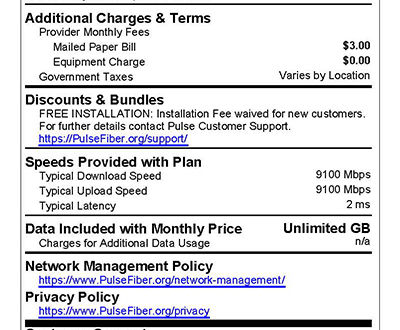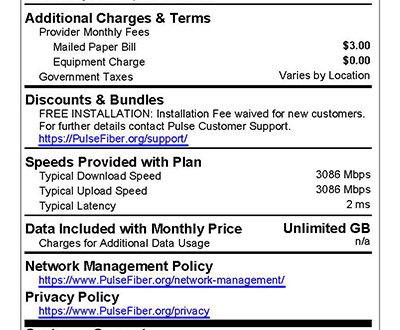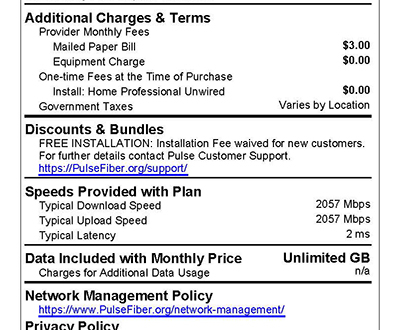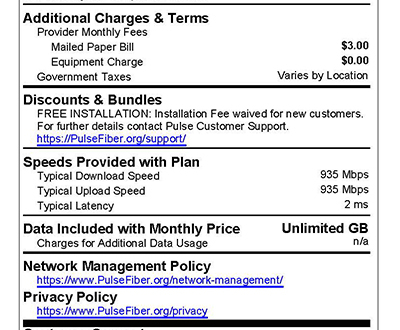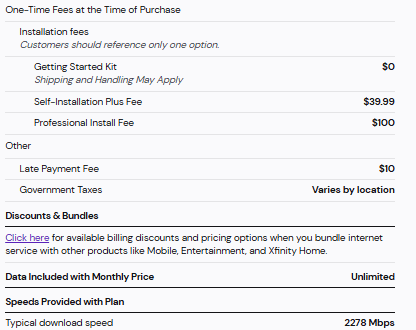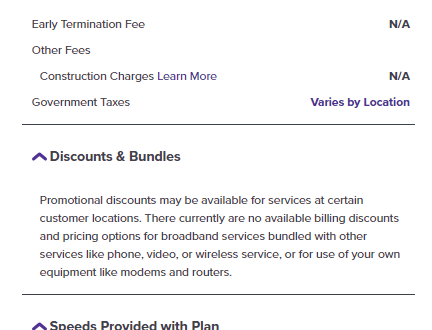Best WiFi for Streaming in Colorado
If your home runs on Netflix, YouTube, Twitch, and a few smart TVs all at once, you don’t just need “fast internet.” You need consistent throughput and low jitter. Across Colorado, the three providers most households should evaluate for streaming are Pulse Fiber Internet, Xfinity, and Quantum Fiber. All can stream well.
Our stance: Pulse is the best overall thanks to true fiber-to-the-home with symmetrical multi-gig tiers, unlimited data, and a track record of reliability. Xfinity is a strong runner-up; especially in areas now seeing higher uploads with DOCSIS 4.0. Quantum Fiber is excellent where its fiber is actually lit at your address.
Colorado WiFi Streaming Shortlist (Specs)
| Provider | Tech | Top speeds (down/up) | Data caps | Typical entry price* |
| Pulse Fiber Internet | Fiber to the home (FTTH) | Up to 10 Gbps / 10 Gbps (symmetrical) | No caps | $59.95–$199.95/mo (tiers incl. 250 Mbps, 1 Gbps, 3 Gbps, 10 Gbps). |
| Xfinity | Cable (DOCSIS). DOCSIS 4.0 in limited CO areas | 300 Mbps, 500 Mbps, 1 Gbps, 1.2 & 2 Gbps download plans. Uploads vary by area; symmetrical uploads available in select DOCSIS 4.0 “X-Class” neighborhoods. | No Caps on current national plans | $55–$130/mo depending on 5-year vs. “Everyday” pricing for 300 Mbps–2 Gbps tiers. |
| Quantum Fiber | FTTH (address-dependent) | Up to 500 Mbps, up to 940 Mbps, and multi-gig (2/3/8 Gbps) in select locations; symmetrical. | No caps | Varies by market and plan. |
*Competitor comparison based on publicly available data as of 10/24/2025. Comparison limited to the information available on competitor websites. Actual speeds may vary. View our broadband labels here for more detailed information on our fiber internet speeds.
Why Pulse is Colorado’s Best WiFi for Streaming
Symmetrical fiber = quick uploads and smooth 4K. Streaming failures in busy homes often show up as buffering right when someone’s phone is syncing photos or your console starts an upload. Pulse’s symmetrical 250 Mbps–10 Gbps tiers keep your upstream wide open, which stabilizes jitter and prevents stream quality from suffering during peak usage. That fiber-to-the-home architecture is Pulse’s default, not an upgrade, and it’s paired with no data caps.
Capacity that scales with the household. Multi-gig tiers aren’t just about bragging rights. They ensure multiple TVs, tablets, and set-top boxes can run high-bitrate streams simultaneously without contention. Pulse’s lineup (250Mbps-10 Gigs) gives you room to grow into next-gen codecs and higher bitrates.
Bottom line: If Pulse serves your address, it’s the most “set-and-forget” pick for streaming—symmetrical fiber, uncapped plans, and plenty of bandwidth for multi-stream 4K/8K households.
Xfinity: Widely Available and Fast
What’s strong for streaming. Xfinity offers 300 Mbps to 2 Gbps download tiers (availability may vary by area), with unlimited data on current national plans; plenty for multiple 4K streams. In select Colorado neighborhoods, Comcast’s national internet plan rollout brings plans with symmetrical uploads (300 Mbps to 2 Gbps). Where available, that erases the classic cable weakness for streamers who also upload, back up, and video chat while watching.
What to watch. DOCSIS 4.0 is still limited-availability; many addresses remain on traditional cable where uploads trail downloads. It’s important to note that DOCSIS 4.0 is not fiber, it is a type of upgraded cable internet. That’s usually fine for pure streaming, but if your home also uploads while streaming, Twitch, cloud backups, camera footage, you’ll see more variability than on fiber.
Bottom line: For addresses without fiber, Xfinity is an excellent streaming option; in DOCSIS 4.0 zones, it gets even closer to fiber-like behavior for busy, high-data-usage households.
Quantum Fiber: Fantastic for Streaming Where Available
Fiber fundamentals done right. Where available, Quantum Fiber provides symmetrical 500 Mbps, ~940 Mbps, and multi-gig (2/3/8 Gbps) options. Symmetry and uncapped usage make it a strong streaming pick on par with any fiber provider.
Address matters. Quantum Fiber’s footprint is patchy across Colorado; at many addresses the non-fiber alternative is CenturyLink DSL, which isn’t well-suited for multiple 4K streams. Always check your exact location to confirm fiber availability before you plan your streaming setup around it.
Bottom line: If the address-checker shows Quantum Fiber at your home, it’s a great streaming choice.
Broadband Labels
- Our 10G plan
- Our 3G plan
- Our 2G plan
- Our 1G plan
- Our 250 Mbps plan
- This is the fastest speed we were able to locate for Xfinity at a Denver, CO address
- This is the fastest speed we were able to locate for Quantum Fiber at a Denver, CO address.
How to pick the Right Tier
- 1–2 TVs, mostly 1080p/occasional 4K: 300–500 Mbps is fine, but fiber is still the better choice, especially if someone in your house regularly streams their own content on Twitch, YouTube, etc.
- 3–5 streams in 4K + smart-home + regular cloud backups: Start at 1 Gbps, favor symmetrical tiers to keep uploads from spiking your latency.
- Heavier homes / 4K + Twitch + remote work or cameras: Go multi-gig (2–3 Gbps or higher). It’s less about “raw speed” and more about buffer headroom when everything’s busy at once.
Final Thoughts on Choosing the Best WiFi for Streaming in Colorado
- Pulse Fiber Internet — Best overall for streaming: symmetrical multi-gig fiber, no caps, and local, utility-style support.
- Xfinity — Excellent and widely available.
- Quantum Fiber — Fantastic where lit, but availability is highly address-specific.
Check your exact address, then pick the plan that makes the most sense for you. That generally points to Pulse first wherever it’s available, then Xfinity or Quantum Fiber based on which one is truly delivering fiber-like uploads at your location.

